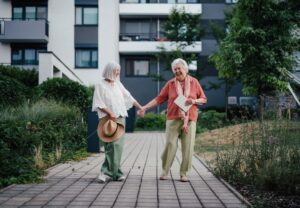Aging is a natural and complex journey, one that brings both wisdom and new challenges. While every person’s experience is unique, many older adults face common hurdles that can impact their quality of life. Our commitment is to provide you with clear, professional, and compassionate information about these challenges. We want to help families and caregivers understand the physical, psychological, social, and emotional changes that can occur with age. By fostering this understanding, we can better support our loved ones in navigating their later years with dignity, comfort, and respect. Reach out today to learn more about how we can help you enhance your golden years.
Navigating the Four Major Old Age Problems
Aging is a gradual process that affects every aspect of a person’s life. This process is not always linear and is influenced by a combination of genetics, lifestyle, and environment. We believe that by understanding the key challenges associated with aging, we can be better prepared to address them with empathy and effective solutions. These challenges can be broadly grouped into four main categories: physical health, psychological well-being, social connections, and emotional stability.
- Physical Health Challenges
The most visible changes associated with aging are physical. The body undergoes a natural decline at the cellular level, which can lead to a variety of health concerns. We want to explain that while some changes are inevitable, a healthy lifestyle can significantly mitigate their impact.
Common physical problems in old age include:
- Chronic Health Conditions: The risk of developing chronic diseases such as heart disease, arthritis, diabetes, and lung disease increases with age. Managing these conditions often requires ongoing medical care and lifestyle adjustments.
- Sensory Decline: Vision and hearing often diminish over time. Conditions like cataracts, glaucoma, and age-related hearing loss can impact safety and communication.
- Bone and Muscle Weakness: As we age, bone density can decrease (osteoporosis), making bones more fragile and prone to fractures. Muscle mass also tends to decline, which can affect strength and mobility.
- Changes in Skin and Hair: The skin becomes thinner, less elastic, and more prone to wrinkles. Hair often thins and turns gray.
- Nervous System Changes: The nervous system can slow down, affecting balance, coordination, and reflexes. This can increase the risk of falls.
We understand that these physical changes can be difficult, but proactive healthcare and supportive services can help manage them effectively.
- Psychological Well-being
Mental health is just as important as physical health, and older adults face unique psychological challenges. It is a misconception that cognitive decline is a normal part of aging. We are here to clarify that while minor memory lapses can occur, significant mental health issues require professional attention.
- Cognitive Decline and Dementia: Conditions like Alzheimer’s disease and other forms of dementia are major concerns. These neurodegenerative diseases cause a progressive decline in memory, thinking, and reasoning skills, eventually impacting a person’s ability to live independently.
- Depression: Depression is one of the most common mental health problems in older adults, but it is often underdiagnosed. It can be triggered by loss, chronic illness, or social isolation.
- Anxiety: Worries about health, finances, or safety can lead to significant anxiety, affecting sleep, and overall well-being.
- Social Isolation
As people age, their social worlds can shrink, leading to loneliness and isolation. We know that maintaining strong social connections is vital for emotional and mental health.
The primary causes of social challenges include:
- Loss of Loved Ones: The passing of a spouse, family members, and friends is a painful reality of growing older, which can leave a significant void.
- Retirement: Leaving the workforce can mean a loss of daily social interaction and a sense of purpose.
- Mobility Issues: Physical limitations can make it difficult to leave the house, attend social gatherings, or participate in community activities.
This loss of social connection is a serious risk factor for depression and cognitive decline. We believe that fostering opportunities for social engagement is a critical aspect of elderly care.
- Emotional Stability
The emotional landscape of old age can be complex, shaped by a lifetime of experiences and the new challenges that arise. We understand that emotional well-being is closely tied to a sense of purpose and worth.
- Feelings of Worthlessness: After retirement or when physical abilities decline, some older adults may feel a diminished sense of value or purpose. A generational gap can sometimes make them feel that their advice or experience is no longer relevant.
- Dependence and Control: A loss of independence can be emotionally difficult. Relying on others for daily tasks may lead to feelings of frustration or helplessness.
- Grief and Loss: The loss of a spouse is one of the most profound emotional challenges an older adult can face, often leading to deep loneliness and grief. Neglect or perceived apathy from family members can compound these feelings.
We want to emphasize that providing emotional support and ensuring that older adults feel heard, respected, and valued is essential for their well-being.
Your Partner in Compassionate Care
We believe that understanding the multifaceted problems of old age is the first step toward providing meaningful and effective support. Navigating these challenges requires patience, empathy, and a dedicated team of professionals. You and your family do not have to face this journey alone.
The team at House Calls Home Care is here to provide guidance and support for you and your loved ones. Our home health services are designed to address the physical, emotional, and social needs of seniors, helping them live with dignity and comfort in their own homes. If your loved one requires compassionate and professional care, please contact us. Speak with our home care services coordinator to get a reliable care provider for your loved one, to ensure they get the best quality of care and companionship to live a peaceful, happy life. Feel free to call HouseCalls Home Care at 718-922-9200 if you or a loved one requires compassionate and competent in-home care services. You can also send an email to us at info@HouseCallshc.org for more information. Our goal is to help you find the best support for your needs




